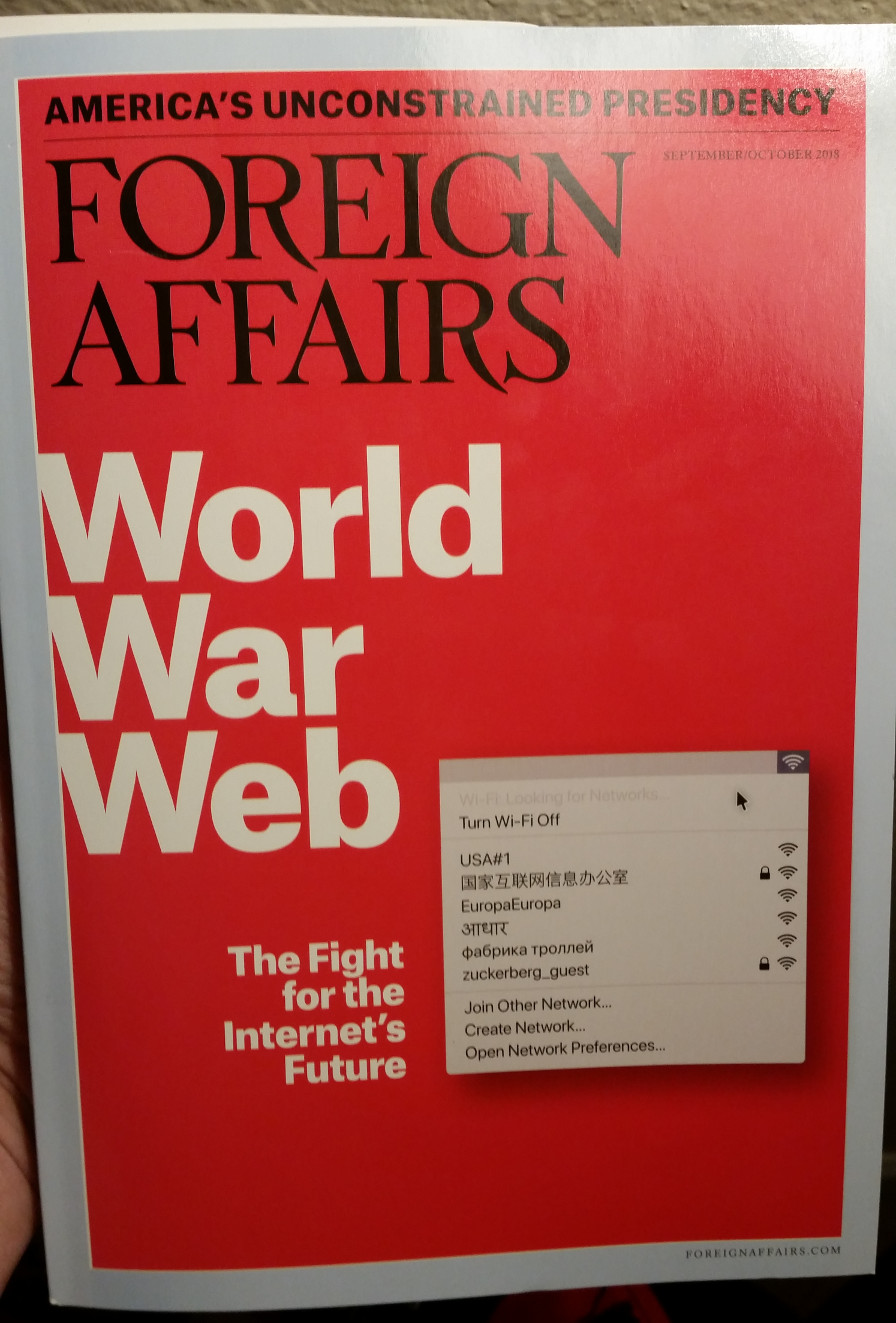
Noted recall: The goal is to describe, in just a few words, what the article is about. Additionally, if I think the article is particularly note-worthy (good or bad), I will comment on that. Compare this to a small sticky note, something to jog your memory about the contents of an article. Of course, if I miss the point of an article, or fail to find anything remarkable, that is entirely the fault of the reviewer.
Available at: https://www.foreignaffairs.com/articles/2018-08-14/world-war-web

When China Rules the Web - Adam Segal
(read 2018-09-10)
China is taking a more active role in shaping the internet through the UN. Wants to mitigate reliance on foreign silicon (domestic IC fabrication). Huge R&D spending in AI and quantum computing, on pace to become world leader in those technologies.
Data to the People - Nandan Nilekani
(read 2018-09-10)
Discusses India Aadhaar ID system. How it works, who uses it, how it's used by businesses. How it's benefited India. Concerns about privacy.
Regulate to Liberate - Helen Dixon
(read 2018-09-11)
Good summary on the GDPR.
The Internet's Lost Promise - Karen Kornbluh
(read 2018-09-11)
Long article that doesn't say much. Criticizes companies and congress for not protecting data.
Battlefield Internet - Michèle Flournoy and Michael Sulmeyer
(read 2018-09-11)
Discussion about US lagging other countries in cyber warfare, and cyber defense, what can be done.
A Big Choice for Big Tech - Viktor Mayer-Schönberger and Thomas Ramge
(read 2018-09-18)
Discusses monopoly power and anti-trust, relating to tech/data companies. Possible public data sharing to limit market share.
Against Identity Politics - Francis Fukuyama
(read 2018-09-18)
Starts with some recent history, says identity politics arose in the last half century or so, but this is implicitly contradicted later in the article. Author yearns for more meritocracy (less egalitarianism). Complains that progressives need to focus more on socioeconomic inequality (?!), don't support (big-L) Labor (?! p. 100). That identity politics threatens free speech (this section was disappointingly short); has spawned counter-identity politics on the right (anti-political correctness). Fukuyama accidentally stumbles upon a point actually supported by research, that politics would be less divisive if conflicted groups (e.g. Republicans vs democrats) would draw people together under larger inclusive groups (such as "American" in this example). Centrist view on immigration, but ends the section saying the left stopped trying to help the poor (?!), and that democrats need to focus more on white votes.
The New Arab Order - Marc Lynch
(read 2018-09-19)
Opens with overview of past ~50 years of history in the middle east (a few pages), to set the ground to give overview (this is the rest of the article) of current political landscape in the same area. Proxy wars, Arab Spring, protests, authoritarianism. Saudia Arabia, UAE, Qatar, Iran, Iraq, Lybia, Syria, Turkey, Yemen, Egypt, Jordan, (barely any mention of Israel, Palestine). ISIS, Assad, Hezbollah, SDF, al-Qadaffi, MBS.
Three Cheers for Trump's Foreign Policy - Randall Schweller
(read 2018-09-19)
Isolationism, protectionism. Global trade is bad. NATO is no longer needed. (Glosses over many details.)
The Unconstrained Presidency - James Goldgeier and Elizabeth N. Saunders
(read 2018-09-19)
Discusses foreign policy. Evolution of National Security Council and how congress has slowly ceded (foreign policy) power to the executive branch since ~ the cold war. That many congressional checks on executive foreign policy are soft (voluntary/self-imposed, tradition), which has become particularly apparent under Trump.
Can Mexico Be Saved? - Denise Dresser
(read 2018-09-23)
Broad overview of politics in Mexico from 2000. Lots of discussion of corruption. Politics under Peña Nieto. Very few words about López Obrador; perhaps more protectionist than former leaders, but probably about as corrupt; will come into office December 1.
China's Future Is South Korea's Present - Hahm Chaibong
(read 2018-09-23)
History lesson, South Korea under Park Chung-hee, his rise to power. Like Xi, altered constitution to rule indefinitely. Like Xi, was critical of, but later embraced Confucianism. Tried to have centrally controlled economic system, but ultimately failed, which eventually caused South Korea to embrace more free markets, economic growth/prosperity eventually caused transition to liberal democracy in 1987. Author proposes China is currently experience hardships of central planning, without much evidence. Not sure how much author is actually proposing China will become a liberal democracy, or on what time scale.
How We Got the Iran Deal - Wendy R. Sherman
(read 2018-09-23)
Good background on the Iran deal, political climate in Iran for the past ~ decade. Enrichment, stuxnet, sanctions. Republicans arguing against diplomacy, GOP congress refusing to support efforts to ensure Iran stops enrichment. Executive order to ratify agreement outside congress. Both sides were holding to the agreement until the USA pulled out without cause, via Trump executive order.
The Forgotten History of the Financial Crisis - Adam Tooze
(read 2018-09-23)
Background on the 2008 financial crisis; focus on liquidity swap lines. Not much to say, but this article was informative.